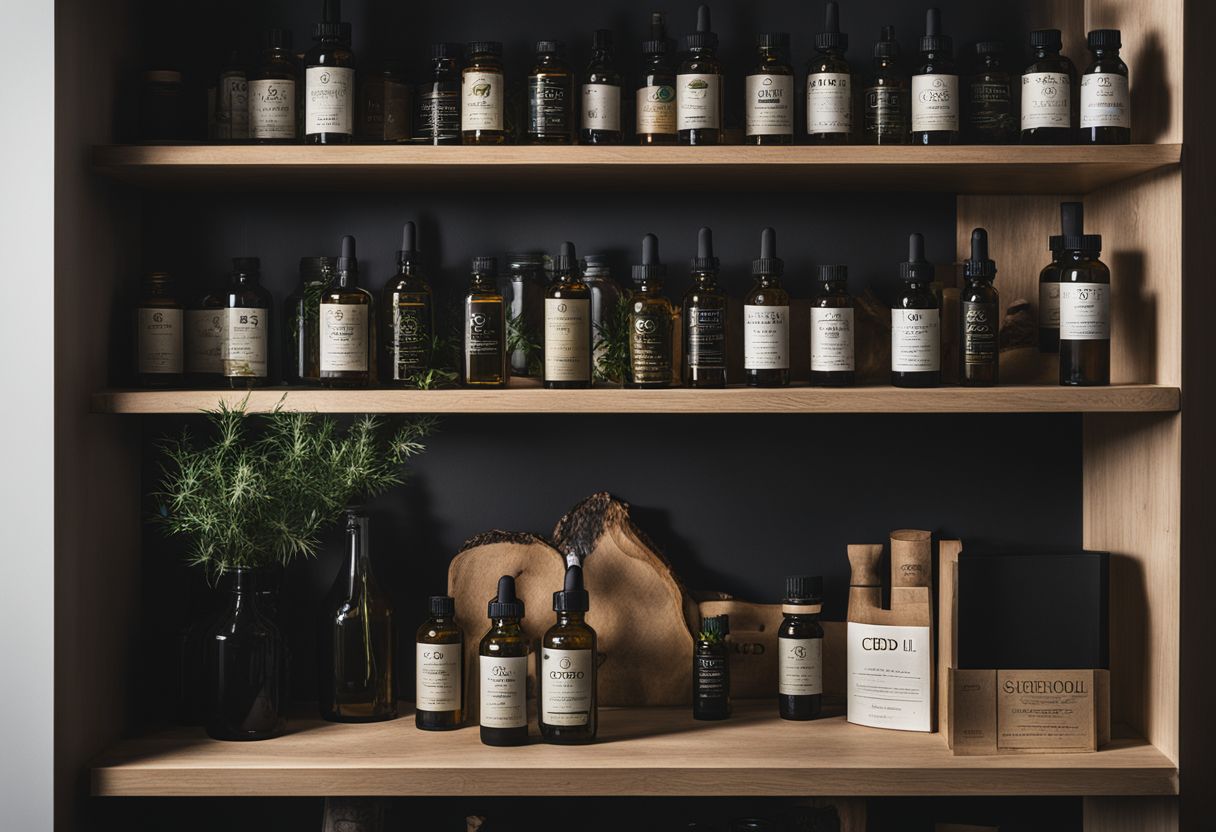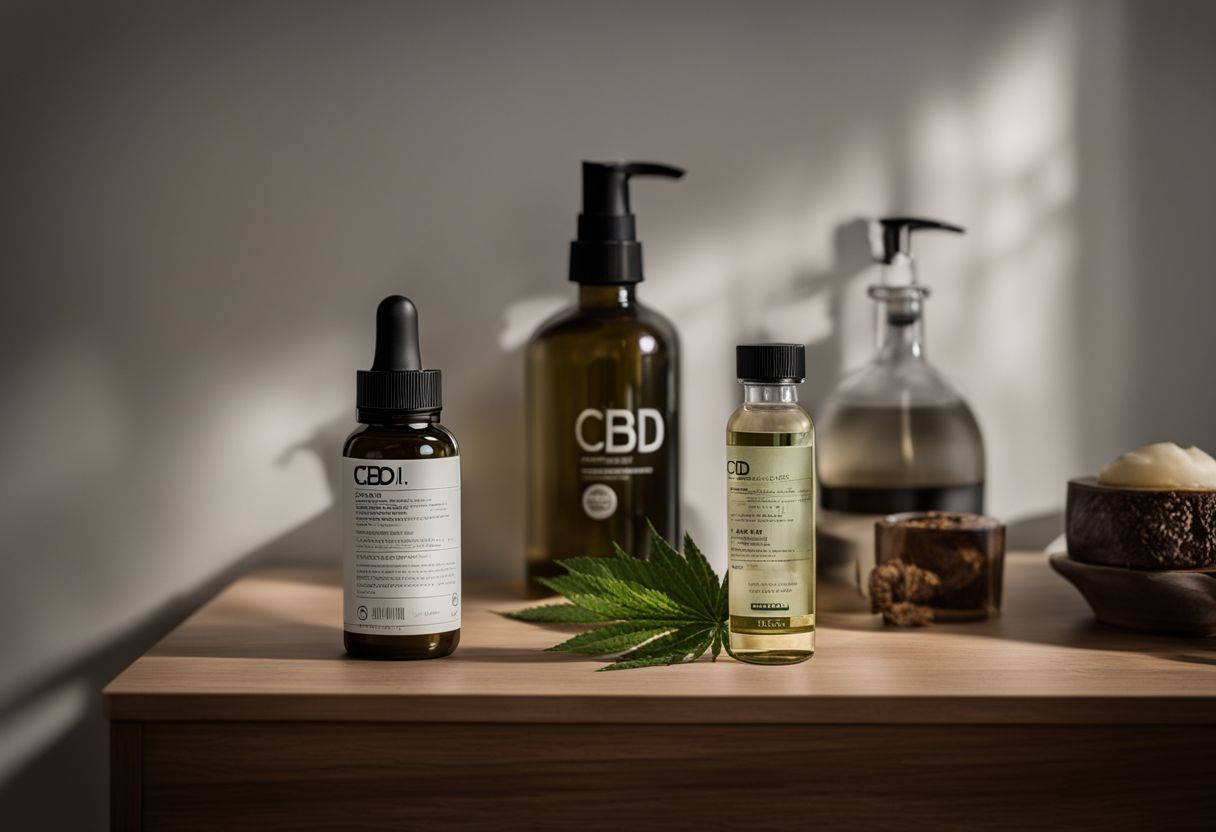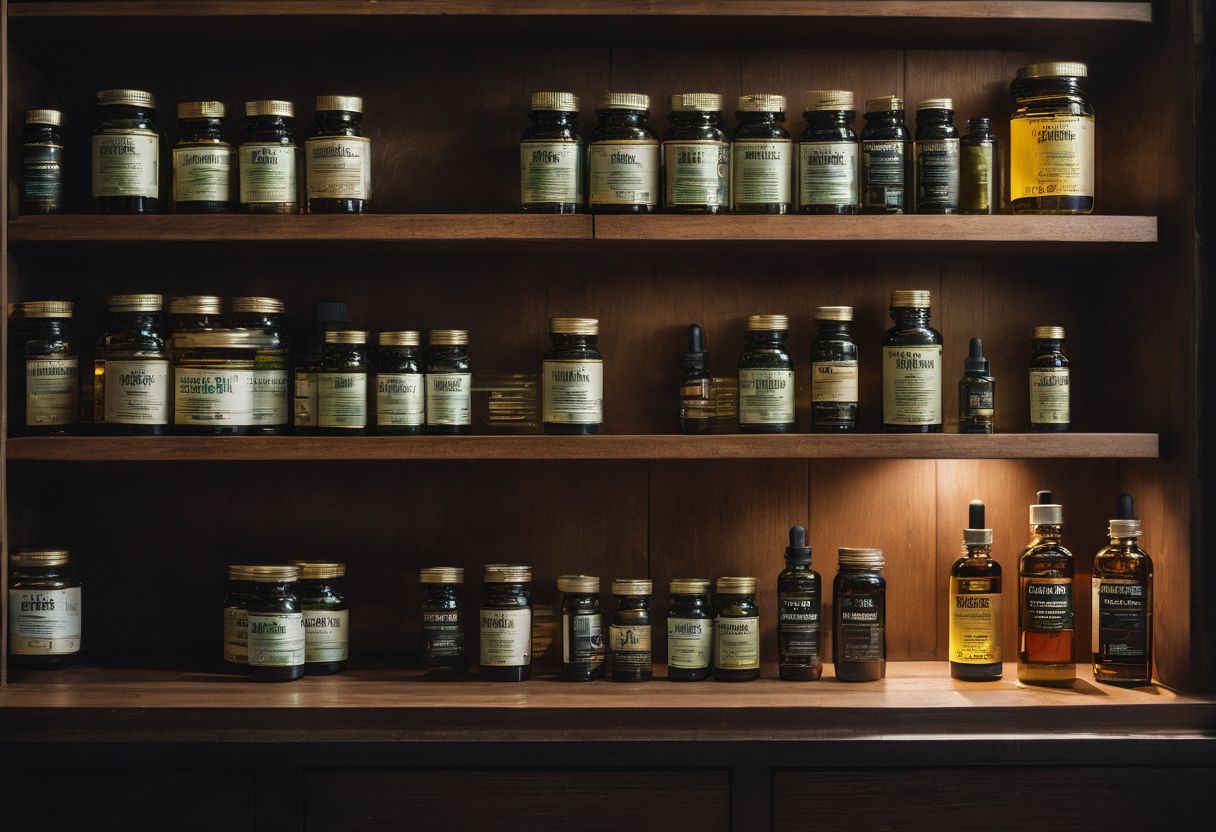Ever found yourself staring at a bottle of CBD oil, wondering if it’s still good to use? You’re not alone; many people are unsure about the shelf life of their wellness products. This article will shed light on how long your CBD oil can last and provide essential storage tips to maintain its effectiveness.
Discover ways to keep your oils fresh and learn what signs indicate it’s time for a new bottle. Let’s dive in and extend the life of your CBD investment!
Key Takeaways
- CBD oil can last from 1 to 2 years if stored properly.
- Keep CBD oil away from light, air, and heat to stop it from going bad.
- Bad smells, color changes, or thick textures mean the oil might be expired.
- Use a tight cap and store in a cool, dark place to keep CBD fresh longer.
- Don’t use CBD oil after its expiration date because it may not work well.
Understanding CBD Oil Shelf Life
 CBD oil shelf life is influenced by factors such as the extraction process, storage conditions, and packaging. Typical shelf life ranges can vary, so it’s important to understand how these factors can impact the expiration date of your CBD oil.
CBD oil shelf life is influenced by factors such as the extraction process, storage conditions, and packaging. Typical shelf life ranges can vary, so it’s important to understand how these factors can impact the expiration date of your CBD oil.
Factors Influencing Expiry
CBD oil doesn’t last forever, much like the food in your fridge. Several factors can change how long it stays good. Here’s what you need to know about what might make your CBD oil go bad faster:
- Light Exposure: Keeping your CBD oil away from direct sunlight helps a lot. Sunlight can break down the compounds in the oil, making it less strong.
- Air Contact: Like opening a bag of chips, when CBD oil meets too much air, it starts to go bad. Use bottles that seal tight to keep air out.
- Temperature Changes: Warm places can spoil your CBD oil. A cool spot at room temperature is best for keeping it fresh.
- Humidity Levels: Moisture can mess with CBD oil, just like it can with cookies or crackers, making them soggy. Keep it dry to protect its power.
- Quality and Type of Oil: Better quality means longer shelf life. MCT oil in many CBD products helps them last from 12 to 18 months.
- Extraction Method: How the oil is made matters too! Oils made using CO2 extraction may stay fresh longer than other kinds.
Typical Shelf Life Range
The quality and freshness of CBD oil are greatly affected by how it’s kept. But even in the best conditions, CBD oil won’t last forever. Most bottles come with a shelf life of 1 to 2 years.
This means you have plenty of time to enjoy its benefits if you store it right.
Knowing this can help you plan when to buy more or use up what you have. Keeping an eye on the expiration date is smart too. It helps make sure your CBD oils still work well for your health and wellness needs.
If MCT oil is in your product, remember it lasts about 12 to 18 months before going bad, so watch those dates carefully!
What Does CBD Stand For and Its Relation to Shelf Life
 CBD means cannabidiol, a substance found in hemp plants. People use CBD oil for its therapeutic effects such as easing nausea or making skin feel good. Like olive oil or cooking oil, CBD oil has a shelf life too.
CBD means cannabidiol, a substance found in hemp plants. People use CBD oil for its therapeutic effects such as easing nausea or making skin feel good. Like olive oil or cooking oil, CBD oil has a shelf life too.
This is how long it can stay good before it might not work as well or could go bad. Usually, CBD oil lasts between 1 to 2 years.
Shelf life is key for keeping your CBD’s quality high. If you put your bottle of CBD oil in a hot and light spot, it will probably get weak faster than if you store it in a cool and dark place like a cupboard or refrigerator.
Also, make sure the container is closed tight so air does not get inside and spoil the oil. Remember these tips when picking where to keep your CBD to help it stay effective as long as possible.
Recognizing Expired CBD Oil
Expired CBD oil can be recognized by its unpleasant smell or rancid odor, changes in color and texture, and reduced potency or effectiveness. It’s important to be able to identify these signs so that you can ensure you are using fresh and high-quality CBD oil for your needs.
Unpleasant Smell or Rancid Odor
Expired CBD oil often develops an unpleasant smell or rancid odor. This change in scent indicates that the oil is no longer suitable for use and has likely degraded. If your CBD oil produces a strong, foul odor, it’s best to refrain from using it as it may have lost its potency.
Additionally, this rancid smell can be a sign of potential contamination or spoilage, making the product unsuitable for consumption.
It is essential to note that if you detect any unusual or off-putting odors emanating from your CBD oil, it’s advisable to dispose of the product responsibly and seek out a fresh supply.
Changes in Color and Texture
Expired CBD oil might develop an unpleasant smell or rancid odor, indicating it’s no longer good for use. Also, look out for any changes in color and texture; if the oil looks cloudy or has unusual particles in it, its quality may have deteriorated due to storage issues or expiration.
These visual clues are important indicators of CBD oil that may not deliver the intended effects. It’s crucial to be attentive to these signs before using CBD oil, as they can help you gauge its freshness and potency.
Now let’s explore how you can properly store your CBD oil to maintain its effectiveness over time.
Reduced Potency or Effectiveness
When it comes to the effectiveness of CBD oil, improper storage can result in a loss of potency. Exposing the oil to light, heat, or air may lead to a reduced shelf life and diminished effectiveness.
This means that if you want to experience the full benefits of CBD oil, ensuring proper storage is essential. Without this care, expired CBD oil might not provide the desired effects due to its decreased potency.
To ensure that you get the maximum benefits from your CBD oil, pay close attention to its storage conditions and expiration dates.
Properly Storing CBD Oil
Choosing the right environment, maintaining purity, and sealing in freshness are crucial for storing CBD oil properly. To learn more about these important storage tips, keep reading!
Choosing the Right Environment
To maintain the potency of your CBD oil, selecting the right environment for storage is crucial. Opt for a cool, dark place at room temperature to safeguard its effectiveness. Ensure that it’s kept in an airtight container to prevent exposure to light and air, which can lead to a decrease in its quality over time.
By doing so, you can prolong the shelf life of your CBD oil and ensure that it retains its beneficial properties for longer periods.
Storing CBD oil in an appropriate setting preserves its potency and helps avoid degradation. A cool, dark location at room temperature along with an airtight container can shield it from factors that might compromise its quality.
Maintaining Purity
To maintain purity, it’s crucial to prevent contaminants from compromising the quality of your CBD oil. When storing your CBD oil, ensure that it is kept away from direct sunlight and extreme temperatures.
Additionally, seal the container tightly to avoid exposure to air, which can degrade the product over time. By taking these steps, you can help maintain the purity and effectiveness of your CBD oil for an extended period.
It’s important to note that maintaining purity goes hand in hand with proper storage habits – keeping your CBD oil in a cool, dark place at room temperature will help preserve its freshness and potency.
Sealing in Freshness
After safeguarding the purity of your CBD oil, it’s crucial to seal in its freshness to maintain its potency. Upon opening a bottle of CBD oil, air and light can start the process of oxidation and degradation.
To prevent this, tightly seal the cap after every use; this simple step can make a significant difference in prolonging its shelf life.
Moreover, consider transferring your CBD oil into an opaque or dark glass container if it comes in a clear one. This assists in blocking out light that could lead to deterioration.
CBD Oil Use After Expiry
Using expired CBD oil may lead to reduced potency and effectiveness due to the degradation of active components.
Here are some crucial things to consider when it comes to using CBD oil after its expiry date:
– Expired CBD oil may not produce the desired effects and could be less potent than fresh CBD oil.
– The color, smell, and taste of expired CBD oil may change, indicating that it’s no longer suitable for use.
– Always check for signs of expiration before using CBD oil such as rancid odor or changes in texture.
– It’s recommended not to use expired CBD oil for any purpose, including consumption or topical application.
Conclusion
In conclusion, understanding the shelf life of CBD oil and how to properly store it is crucial for maintaining its potency. Factors such as storage conditions and the type of carrier oil can affect how long CBD oil lasts.
Recognizing signs of expiration, like changes in odor or color, is important for ensuring you’re using a high-quality product. By storing CBD oil in a cool, dark place and using it within a reasonable timeframe after opening, you can maximize its effectiveness.
Remember to check the packaging for the expiration date and follow proper storage practices to get the most out of your CBD oil.
If you’re curious to learn more about CBD and its wide range of benefits, be sure to read our detailed guide “What Does CBD Stand For?”.
FAQs
1. What is the shelf-life of CBD oil?
The shelf life of CBD oil is usually around 1 to 2 years. Look at the certificate of analysis or product label to find out how long your CBD oil will last.
2. How should I store my CBD oil?
Keep your CBD oil in a cool, dark place away from direct light and heat to help it last longer. Storing it with care helps maintain its freshness and quality.
3. Can I use CBD if I’m breastfeeding?
If you are breastfeeding, talk to a doctor before using any products with cannabidiol (CBD), like oils or gummies, because they may not be safe for breast milk.
4. Are there different types of CBD that might affect how long it lasts?
Yes! There are full-spectrum CBD products that include other compounds along with coconut oil which might change their shelf lives compared to other kinds of cbd like topical creams or ointments.
5. Does taking cbd in different ways change how long it works?
Yes, how you take your cbd—like topically through creams, sublingually under the tongue, or eating gummies—affects absorption and can also influence things like dosage and elimination half-life which decides how long its effects may last.






